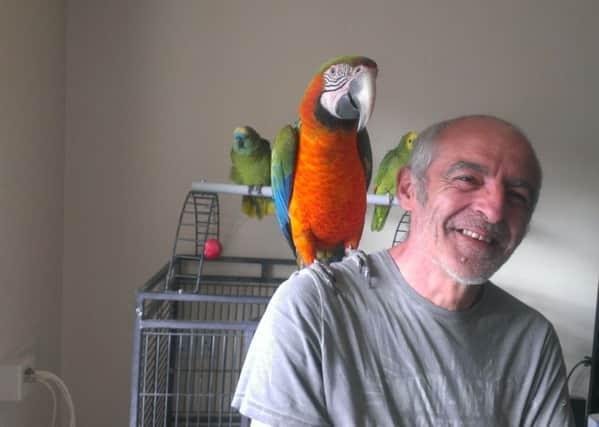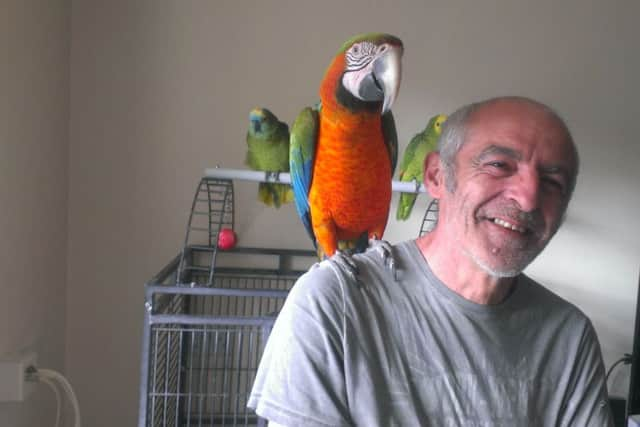Video: Derrick's Parrots are helping people with dementia


The owner of a Sutton parrot rescue service has discovered his feathered friends have an uncanny ability to connect with people with dementia, Alzheimers and learning difficulties.
Derrick Buttigeg has dedicated years of his life to helping find a home for abandoned, mistreated and orphaned birds at his Potty Parrots Rescue.
Advertisement
Hide AdAdvertisement
Hide AdBut recently he discovered an unexpected positive aspect of the colourful and talkative creatures.


Derrick said: “I have been doing shows with rescued birds for years .
“But it wasn’t until two years ago I realised that people with Alzheimer’s, dementia and learning difficulties found them soothing .
“If they were ‘throwing a wobbly’ as soon as a parrot came they calmed down - why I don’t know.
Advertisement
Hide AdAdvertisement
Hide Ad“I live in a flat and I knew a woman with second stage Alzheimer’s.


“One day she was becoming very agitated and I went to see if I could help.
“For some reason I walked in with one of my parrots on my shoulder and she immediately just calmed down completely.
“It seemed something positive and very interesting was happening and it was down to the parrot.
Advertisement
Hide AdAdvertisement
Hide Ad“It calms them down - the experience seems to give them something nothing else can.”
Derrick now regularly visits residential homes around the area
“I go to six of them now at least twice a year - around here Sutton Lodge, Sutton Manor and Cedar Court - the parrots are getting more and more popular with the residents,” said Derrick.
“There are plans for me to visit even more - the sky’s the limit.”
Advertisement
Hide AdAdvertisement
Hide AdPotty Parrots Rescue is currently home to 42 birds and Derrick has seven of his beady eyed companions in his flat.
He said: “All the birds are rescued and we retrain them so they can be handled by the public.
“We want to offer aid to our community’s unwanted, abandoned and abused parrot population.
“Our main goal is to find loving, devoted and educated homes for the parrots and other exotic birds that are in need of them.
Advertisement
Hide AdAdvertisement
Hide Ad“We strive to educate the public about the behaviour, emotional, physical and medical needs of these magnificent creatures.”
For more information visit http://www.pottyparrotsrefuge.com/
This week is Dementia Awareness Week and Nottinghamshire County Council health chiefs have provided Chad with top tips on how best to speak and respond to people with the condition.
Difficulties with language occur in all forms of dementia, which can be frustrating and distressing for the person with dementia and for those around them.
Advertisement
Hide AdAdvertisement
Hide AdWhilst close relatives of people with dementia gain an understanding on how best to communicate with their loved one, people in the wider community may shy away from speaking to people with the condition for fear of upsetting them.
• Speak clearly, calmly and at a slower pace
• Avoid speaking sharply or with a raised tone
• Use short, simple sentences and do not ask too many direct questions
• Avoid talking as if they are not there or speaking to them like a child
• Be mindful of body language as sudden movements or tense facial expression can cause upset or distress – match body language with what is being said
Advertisement
Hide AdAdvertisement
Hide Ad• Never stand too close or stand over someone to communicate as it be intimidating.
Councillor Muriel Weisz, Chair of Nottinghamshire County Council’s Adult Social Care and Health Committee, said: “Whilst public awareness of dementia and the impact it has on people’s lives is increasing, it can be difficult to know how best to communicate with a person with the condition.
“Research shows that a clear and calm manner can help people with dementia to understand what you are saying and avoid being overly challenging when they are confused about events, which can be very distressing for them.
“Dementia can be very isolating so including people with the condition in group conversations where possible and talking to them as an adult is also beneficial.”
Advertisement
Hide AdAdvertisement
Hide AdThe Council currently provides care and support, including care home placements, to around 1,500 residents with memory and cognition issues including dementia, which amounts to around £30m a year.
‘Memory Lane kits’ or reminiscence packs to support people with dementia and their loved ones are be available in Nottinghamshire libraries.
In addition, ‘The Books on Prescription: Dementia Collections’ for carers and people in the early stages of dementia to help better understand the condition can be loaned from the larger libraries.
People can also become a Dementia Friend to understand what it is like to live with dementia and the small things we can all do to make a difference to people living with the condition by www.dementiafriends.org.uk
For more information on communicating with people dementia visit the Alzheimer’s Society website at www.alzheimer